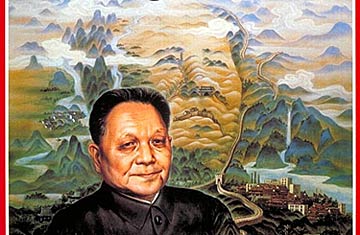
(10 of 20)
"They had two systems for the economy — 'line authority' and 'bloc authority.' " Line authority ran from the central-government ministries down to the smallest factories and mines in China, north or south. "We found one factory with 4,000 workers but only one toilet. The workers would line up for hours to get to the toilet. But any building of more than 200 sq. ft. had to be approved by line authority at the top, the State Planning Commission in Peking. Should such a committee have to decide about toilets? We had a factory in Hebei that produced good worsteds that people wanted for suits. But the plan called for the mill to produce coarse woolens." So the mill met its quotas in coarse woolens, and they piled up in the warehouses. All over China, Peking set quotas and ignored what the people, the market, demanded.
"Take bloc authority," Liao went on. "That meant the provincial governments did the trading and marketing. Villages in north Jiangsu, for example, raise tomatoes, so they need bamboo staves to make the wicker tepees that hold tomatoes up. Anhui [just across the border] had surplus bamboo. But tomato farmers in Jiangsu couldn't get any bamboo from Anhui because that crossed a provincial border. That's bloc authority."
Suddenly, he exploded:"Peanuts! Everybody in China likes to eat peanuts. But peanuts disappeared entirely; the peasants couldn't ship to the towns. Eggs! You could buy eggs in the city only on holidays. Meat! There was no meat in the cities to buy. Everything was on coupons. Dates! Not even coupons could buy you dates — you needed a doctor's prescription."
On he went with wry amusement as he told how the new regime was untangling "egalitarianism." It would be years before it was all untangled. But much had already been accomplished, particularly where the peasants had been invited into the "responsibility" system and had restored the market system. It was the countryside where I would see reforms working best.
REMOVING
THE
HANDCUFFS
The countryside means almost anywhere, for 80% of China's people still work in the fields. Start with Sichuan, my home base for six years. The province is so fertile that the old phrase ran, "Anything that grows in China, grows better in Sichuan."
Sichuan used to feed itself. But then, from the czars of the Cultural Revolution, came the order that two rice crops be grown a year. Rice, however, is a tricky crop. Sichuan had evolved its own two-crop culture — rice in summer and wheat or rapeseed in winter. But Peking had ordered two rice crops a year. So Sichuan tried to meet its quotas. When the climate made that impossible, the government had to send grain into this onetime surplus province, and the peasants hungered.
I found Sichuan enjoying change, as a man does when handcuffs and leg irons are removed. The new reforms were quite simple: the peasants could now decide what to plant and when, and whether to sell any surplus to state markets or free markets. If they met their quotas to the state, the surplus was theirs to eat or to sell. The margin is still precariously thin — just enough for peasants to keep their chins above water. Five
